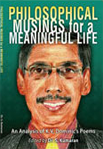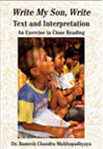Fiction
OUR DEAR BHAI
Our Dear Bhai
Â
Â
“Sandeep Sir,†I turned back and looked at the direction of the sound. Nobody was found except that young mango tree. What it the sound of Bhai? I thought for a moment. I resumed listening to my colleague’s chattering. “Sandeep Sir,†again the sound was heard from back. I turned back and looked. But nobody was there.
“What are you looking at?†my colleague asked.
“Sir, didn’t you hear Bhai calling me?â€
“Bhai calling you? No, I didn’t hear. Something wrong with your ears,†he giggled.
“No, Sir. I heard him calling me twice.â€
“Might be a hallucination, Sandeep. Let me leave you a little early as I have some shoping. You may rest here till the body cools.â€
“OK, Sir. You may go. I will sit here for fifteen minutes till the sweating is over.â€
We have been playing shuttle badminton as have been wont for the past fifteen years. Once my colleague left, my mind took me to Bhai again. I searched for him again in vain.
Rambahadur—we call him Bhai—is the watchman of our college. He is a Gurkha, aged 54. Characteristic of his race, Bhai is honest, brave and cent percent loyal. He is indeed out ‘bhai’ (brother), an elder brother looking after us, our college and the premises from anti-social people. He is very loving and service-minded to the whole college community. He has no reluctance to do any duty—even a coolie’s or menial’s. When we teachers and non-teachers work only three to eight hours in the day time, Bhai’s duty is 24 hours, sleeping just four hours at late night. He has conquered not only the college community with his pure love, but also the whole town. Bhai is known to all people in the town, young and old. Though he is illiterate, he can be sent as errant to any nook and corner of the country. During feasts and celebrations in the college, he is at the forefront serving food and compelling us to eat more and more. He always has the adage that our happiness is his happiness.
When after badminton play we took rest at the steps of the college library in the evening, Bhai used to come to us and entertain with his Nepalese ethos and experience. His accents of the regional language are very funny to listen to and sometimes we could not follow what he said. Then he would explain it in Hindi. He said that in Nepal he had four acres of land at the town which valued a hundred thousand rupees per cent. The news was astounding to us because he was a millionaire there, far well of than us, and here is just like a servant. He would never sit on the step near us though we compelled him. He with all his humility would say that we were big people and he only a peon. He would squat on the floor of the porch. One day as we took out seats after the play Bhai was watering a plant.
“Bhai, what’s that plant?†I asked him.
“Sir, it’s a mango plant which I bought from the nursery for Rs. 50. It will remain here in memory of me after I retire from service.â€
Bhai watered it everyday all through the summer. Some days he would draw our attention to it and say, “Sirs, my mango plant is fast growing. Sometimes it may bear fruit before I retire.â€
Bhai is twice married. His first wife died of some disease which is still unknown to him. He has four children in her. Bhai used to visit his family one once in a year during the summer vacation. As he is a non-vacation staff he will take his earned leave and casual leaves and spend some one and half months with his family. As money order could not be sent to Nepal, he could not send any money to his home when there was any dire necessity. His first wife died since she could not be treated at the proper time. Bhai’s eldest son is working as a watchman in another college some sixty kilometres away from our college. With the meager salary he earned plus some money borrowed from us he would visit his house every year. Keeping money safe during the train travel (long five days) was highly risky, he used to say. Bhai went home along with one or two friends working in our neighbourhood. When one was sleeping, the other would sit awake. Thousands of rupees were kept in the inner pockets of the under garment specially stitched for the purpose. Though Bhai had land worth millions of rupees, his family lived in property. He was not willing to dispose the property to wipe out poverty. He built a house with a loan taken from the college co-operative society.
One day Bhai came to us in the evening. He was in tears. He took out from his pocket a photo and showed us.
“Sirs, this is my daughter. She is no more now.â€
We looked into the photo. It looked like a film star’s aged seventeen or eighteen. Extremely beautiful!
“Bhai, what was her disease?†I enquired.
“Sir, she died last week. I received the letter today. She had some fever, it is written, and she was taking medicine. There aren’t good hospitals nearby and who is there to take her to the city hospital, sir?†he was sobbing.
“Didn’t they phone you the day she died?â€
“Sir, there is no phone facility in our land.â€
We didn’t know how to console him. And who on earth could do it? Bhai with that photo reminded me of Rehman of Tagore’s “Kabuliwallah†treasuring his daughter’s photo and longing for the reunion with her.
After his first wife’s death, Bhai married again and has two children in that alliance. They are below the age of ten now. Bhai has only one more year of service left here. We used to ask him what he would do after the retirement. He replied that if his service was needed in our college he would continue here as a guest watchman, ready to serve for Rs. 5000 per month. Going back to his country means sitting idle there. He would get no employment there. His wife and children can mange the work in their land. So he longed to continue here till here. Moreover he has been of this country since he was sixteen, and he wishes to continue here till he is aged. In some evenings after an intake of low-priced liquor—his greatest enjoyment—he would come to the campus wavering and try to evade us. Then we would call him as to hear his intoxicated talk. The way he controlled his words and how he failed in it was interesting to the ears.
*Â *Â *Â *Â *Â *Â *Â *Â *Â *Â *Â *Â *Â *Â *Â *Â *
It was a Sunday. The time is 8 a.m. my telephone rang. I took the phone.
“Hellow Sandeep, I am the Principal calling.â€
“Hellow Sir, what’s the news.â€
“Our Bhai is found dead in his room. Please come soon.â€
“Oh my God! I am coming.â€
I rushed to the college and went to the Principal’s room. He was not there. I ran to Bhai’s room. Bhai’s body was found on his bed. He was half naked. The Principal was there along with a few other staff.
“Sir, how did it happen?†I asked the Principal.
“Early morning he got up and appeared before my room with the newspapers. The he went to the pump house and pumped water to the tank. I rang for him at 7.30 a.m. but he didn’t turn up. I tried again after fifteen minutes but he didn’t appear. So I went to his room and to my horror found him dead as it is. Might be a cardiac arrest.â€
The police were informed and they came within five minutes. Soon there was a rush of college staff and neighbours. The dead body was taken to the hospital for postmortem. The doctor confirmed that it was a cardiac arrest. We couldn’t believe that our beloved Bhai is no more with us. The ladies staff cried.
Principal declared a holiday for the college on Monday. A condolence meeting was also arranged. Bhai’s body, which was kept in the freezer, was brought to the college on Monday at 10 a.m. The students, management representatives and the neighbours swarmed around the body and paid homage to Bhai. Condolences speeches came one after another. As the body could not be taken to Nepal—it is a huge expensive thing—it was decided to cremate the body in the Municipal crematorium. The only kin possible to be consulted was his eldest son working in a college some sixty kilometers away. He was phoned and he came on Sunday itself. Bhai’s dead body was taken in an ambulance to the crematorium. We all followed it in our cars and hired vehicles. The corpse was taken from the ambulance and placed on the mobile table to be carried to the furnace. With the help of his relatives and friends from Nepal, Bhai’s eldest son did necessary burial rites. Just for five minutes. He was crying and tears were flowing from his cheeks. We couldn’t bear the sight. I just thought of his miserable wife and other children who could not see his body and give the final kiss. My eyes were filled with tears. Who would solace them? It was only one month before that he came back from his house. The warm memories of his stay with them were still in their minds and now they have to be frozen and dead. Inexplicable is the grief of that bereaved family! Compared to them our loss of Bhai is nothing. The corpse was slid to the incinerator and the door was shut. The switch was on and with a horrifying thud the electric incinerator started functioning. LPG from three cylinders was burning Bhai’s body. Smoke appeared thick at the tall chimney. Bhai’s soul was going up to the heaven. I watched it for sometime. After an hour we returned to our houses. Bhai’s memory haunted me for several days and disturbed my sleep.
*Â *Â *Â *Â *Â *Â *Â *Â *Â *Â *Â *Â *Â *Â *Â *Â *Â *Â *Â *Â *Â *Â *Â *
Oh! The time is 8 p.m. I am all alone there before the college library. I looked at the young mango tree which Bhai had planted three years back. There were bunches of flowers on it. Bhai’s eldest son came with Bhai’s second wife to our college today to complete formalities of the pension. Some eighteen months have passed since Bhai left us. Yet his pension has not been released and come to his wife’s hands. Why I heard Bhai calling me was only a hallucination, I understood. I returned to my house sad and forlorn.





